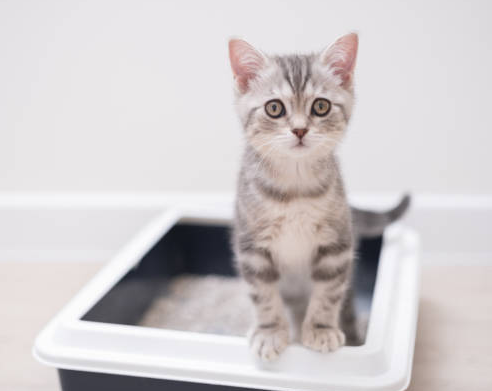
As any cat owner knows, selecting the right cat litter is not as simple as it might seem. Cats, with their sensitive noses and foot pads, can be very particular about the litter they use. In fact, many cats develop aversions to certain types of litter, leading to issues with litter box use. But why are cats so sensitive to cat litter? Let’s explore some of the reasons behind this sensitivity and how you can ensure your feline friend remains comfortable and happy with their litter box.
Sensory Sensitivity
Cats have an extraordinary sense of smell—estimated to be between 14 to 16 times stronger than humans. This makes them highly sensitive to scents, including those found in scented or heavily perfumed litters. While some cats may be indifferent to strong scents, others can find them overwhelming or even irritating. A strong, artificial fragrance can turn a litter box into a source of stress for some felines, leading them to avoid it altogether.
Additionally, the texture of the litter is crucial. Cats have a very sensitive sense of touch in their paws, and certain litter materials might feel unpleasant or painful to them. Litters with rough granules or irregular shapes can be uncomfortable to dig through, prompting some cats to refuse to use the box.
Consider Kitties’ Health
Health is another important factor influencing litter sensitivity. Cats with sensitive skin, allergies, or respiratory issues can be more affected by the materials and chemicals used in certain litters. For example, silica gel litter, while popular for its absorbency, can be irritating to some cats’ respiratory systems due to the dust it produces. Similarly, clay-based litters often contain chemicals that may cause irritation in cats with more sensitive skin or allergies.
Urinary tract issues, common in older cats or cats with specific health conditions, can also influence litter choice. Cats with these conditions may have more sensitive paws and may avoid using a litter box if the litter causes discomfort. Cats may even associate a painful experience with the litter they used, leading to further aversion to it.
Keep My Bathroom Clean – PLEASE!
Cats are naturally clean animals and are very particular about their environment, including their litter box. Cats often prefer a clean, unscented litter box free of any unpleasant odors, so choosing a litter that clumps easily and absorbs moisture well is essential. If a litter doesn’t control odor effectively or retains moisture, a cat might reject it and start eliminating elsewhere.
A dirty litter box can also cause stress or anxiety, and some cats may even develop behavioral problems if their litter box isn’t up to their standards. This is why it’s important to clean the litter box frequently and to choose a litter that supports good hygiene.
Where Am I?
Just like with food, environmental changes can influence a cat’s litter preferences. A cat that has been using one type of litter for years may resist switching to a new brand or material, especially if the change is sudden or drastic. Cats are creatures of habit and prefer routine, and introducing a new type of litter might disrupt their comfort. Even minor changes in their surroundings can affect their behavior, and it’s not uncommon for a cat to avoid the litter box if there’s a change in their environment, such as moving homes, the introduction of new pets, or even a shift in the type of litter being used.
Yer Freakin Meowt!
Cats, like people, can have psychological reactions to their litter box. Some may develop litter box aversions due to negative associations or past experiences. If a cat had an unpleasant encounter in a particular litter box—such as the litter being too rough on their paws or the box being too dirty—they may refuse to use that box again, even if the conditions improve. In these cases, it’s important to create a positive, stress-free association with the litter box, which can sometimes mean switching to a more suitable litter.
Choose Wisely
Given the sensitivity cats can have to certain litters, it’s essential to select one that suits your cat’s needs. Here are a few tips to help you find the right litter:
- Avoid Strong Scents: Opt for an unscented litter or one with a light, natural scent. Some cats find artificial fragrances overwhelming.
- Go for Soft, Fine-Grain Litter: Cats tend to prefer softer litters. Consider silica gel, natural clumping, or clay-free options, as long as they don’t irritate your cat’s skin or paws.
- Monitor for Allergies or Sensitivities: If your cat shows signs of respiratory distress or paw irritation, consider switching to a hypoallergenic litter.
- Keep the Box Clean: Regularly scoop the box (at least twice daily) and change the litter and switch out boxes (at least every two weeks) as needed. Cats are more likely to use a litter box that’s kept clean and fresh. This is why it’s imperative you have at least two litter boxes (I opt for the corner style with high sides) so when it’s time to change the box you have one at the ready. This is assuming you only use one box – which I do, and I have two cats. They are so bonded, they often use the litter box at the same time – never have I seen anything like it!
- Transition Gradually: If you’re changing the type of litter, do so slowly by mixing the new litter with the old one to allow your cat to adjust.
Understanding why cats are so sensitive to certain cat litters requires paying attention to their sensory sensitivities, health, and psychological well-being. By choosing a litter that meets your cat’s needs and preferences, you can ensure that your feline companion remains comfortable and happy with their litter box. Cats may be particular, but with the right litter and a little patience, you can create an optimal environment for your pet.
Ciao,


